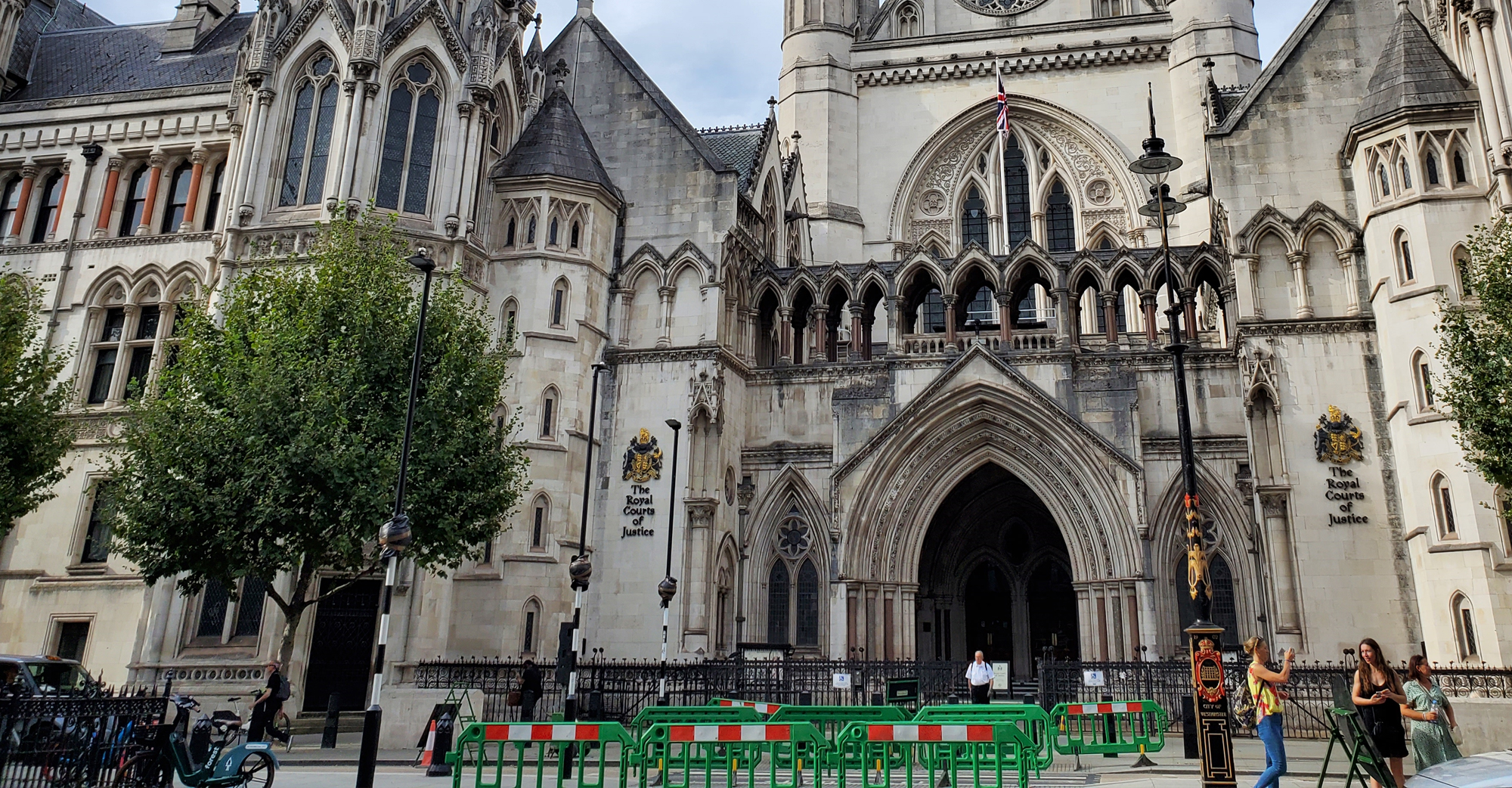Which army liberated the Dachau Concentration Camp in World War 2? Which musician has accumulated the most wealth? These questions and more are addressed in Traveling Boy’s 28th installment of Global Travel Trivia Games. No one will see your answers except for you.
Global Trivia 28
You have multiple choices. An explanation and a reference comes after every question. There is no fixed order so you can choose from any of the boxes. The SHADED BOXES are what you already answered. Your final score is at the END. Don't hit REFRESH unless you want to start all over. This is part of a continuing series in Traveling Boy.
Start
Congratulations!
You have completed Global Trivia 28.

You scored %%SCORE%% out of a possible 5 points.
Your performance was: %%RATING%%
Your answers are highlighted below.
Question 1 |
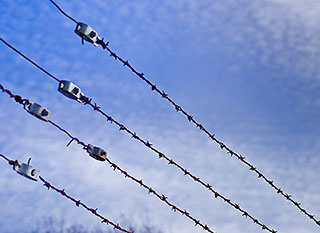
In 1945, this Allied Power liberated 32,000 prisoners at Dachau, the first concentration camp established by the Nazis on German soil. Name the nationality of the army.
A | Free France |
B | Great Britain (includes Canada) |
C | Norway |
D | Soviet Union (Red Army) |
E | United States |
Question 1 :
ANSWER: E. United States
On April 29, 1945, the U.S. Seventh Army liberated 32,000 prisoners at the Nazi regime's Dachau concentration camp.
Only five weeks after Hitler took power as German chancellor in 1933, Dachau became Nazi Germany’s first concentration camp. It has the sad distinction as the concentration camp that was in operation the longest, nearly all twelve years of the Nazi regime. It is located on the grounds of an abandoned munitions factory northeast of the medieval town of Dachau, about 10 miles northwest of Munich in the southern Germany state of Bavaria. Dachau's close proximity to Munich, where Hitler came to power and where the Nazi Party had its official headquarters, made Dachau a convenient location. From 1933 to 1938, the prisoners were primarily German nationals: communists, leading socialists and Christian (mainly Catholic) clergy and other "enemies of the state” for not conforming to the Nazi Party line. But over time the Nazis began to send Germans of Jewish ancestry to the camp, leading to more than 10,000 prisoners. Once Austria was annexed and Czechoslovakia was defeated, the citizens of both countries became the next prisoners at Dachau. Subsequently, the camp was used for prisoners of all sorts, from every nation occupied by the forces of the Third Reich. In 1940, Dachau became filled with Polish prisoners, who constituted the majority of the prisoner population until Dachau was officially liberated in 1945.
Though Dachau was chiefly a political camp, rather than an extermination camp, around 160,000 prisoners were sent to its main camp, with over 32,000 inmates were either executed or died of disease, malnutrition or brutalization. Dachau was also the first Nazi camp to use prisoners as human guinea pigs in medical experiments. Nazi scientists tested the effects of freezing and changes to atmospheric pressure on inmates, infected them with malaria and tuberculosis and treated them with experimental drugs, and forced them to test methods of making seawater potable and of halting excessive bleeding. Hundreds of prisoners died or were crippled as a result of these experiments.
As the Allies advanced across Europe at the end of the Second World War, they came across concentration camps filled with sick and starving prisoners.
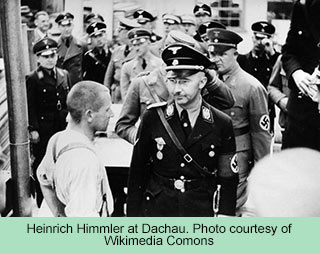
The first major camp to be liberated was Majdanek near Lublin, Poland in July 1944. Surprised by the rapid Soviet advance from the east, the Nazis attempted to hide the evidence of mass murder by demolishing much of the camp, but parts - including the gas chambers - were left standing.
As the Soviet Army advanced from the east, the Nazis transported prisoners away from the front and deep into Germany. Some prisoners were taken from the camps by train, but most were force-marched hundreds of miles, often in freezing weather and without proper clothing or shoes. Over the course of these death marches, which sometimes lasted weeks, tens of thousands of people died from cold or hunger, or were shot because they could not keep up.
In January 1945, Auschwitz-Birkenau was overrun by Russian soldiers. It was the largest extermination and concentration camp, to which over a million people had been deported from all over Europe. Upon liberation, only a few thousand prisoners remained. Most of the surviving prisoners had been taken away on death marches.
Survivors who were moved from camps close to the front were sent to Bergen-Belsen, Buchenwald, Mauthausen, Terezín (Theresienstadt) and Ravensbrück, or one of their many sub-camps. The resulting overcrowding in these camps hastened the spread of disease and caused many more deaths.
In every camp, Allied soldiers encountered appalling scenes. Bergen-Belsen was liberated by British forces on 15 April 1945. It had become exceptionally overcrowded after the arrival of survivors of the death marches. Thousands of unburied bodies lay strewn around the camp, while in the barracks some 60,000 starving and mortally ill people were packed together without food or water. The mortality rate amongst those suffering from typhus was over 60 per cent.
The first intake of food proved fatal for many prisoners, too weak from starvation to digest it. For the survivors of the Nazi camps, the road to recovery would be long and painful.
On April 29, 1945, the U.S. Seventh Army liberated 32,000 prisoners at the Nazi regime's Dachau concentration camp.
Only five weeks after Hitler took power as German chancellor in 1933, Dachau became Nazi Germany’s first concentration camp. It has the sad distinction as the concentration camp that was in operation the longest, nearly all twelve years of the Nazi regime. It is located on the grounds of an abandoned munitions factory northeast of the medieval town of Dachau, about 10 miles northwest of Munich in the southern Germany state of Bavaria. Dachau's close proximity to Munich, where Hitler came to power and where the Nazi Party had its official headquarters, made Dachau a convenient location. From 1933 to 1938, the prisoners were primarily German nationals: communists, leading socialists and Christian (mainly Catholic) clergy and other "enemies of the state” for not conforming to the Nazi Party line. But over time the Nazis began to send Germans of Jewish ancestry to the camp, leading to more than 10,000 prisoners. Once Austria was annexed and Czechoslovakia was defeated, the citizens of both countries became the next prisoners at Dachau. Subsequently, the camp was used for prisoners of all sorts, from every nation occupied by the forces of the Third Reich. In 1940, Dachau became filled with Polish prisoners, who constituted the majority of the prisoner population until Dachau was officially liberated in 1945.
Though Dachau was chiefly a political camp, rather than an extermination camp, around 160,000 prisoners were sent to its main camp, with over 32,000 inmates were either executed or died of disease, malnutrition or brutalization. Dachau was also the first Nazi camp to use prisoners as human guinea pigs in medical experiments. Nazi scientists tested the effects of freezing and changes to atmospheric pressure on inmates, infected them with malaria and tuberculosis and treated them with experimental drugs, and forced them to test methods of making seawater potable and of halting excessive bleeding. Hundreds of prisoners died or were crippled as a result of these experiments.
As the Allies advanced across Europe at the end of the Second World War, they came across concentration camps filled with sick and starving prisoners.

The first major camp to be liberated was Majdanek near Lublin, Poland in July 1944. Surprised by the rapid Soviet advance from the east, the Nazis attempted to hide the evidence of mass murder by demolishing much of the camp, but parts - including the gas chambers - were left standing.
As the Soviet Army advanced from the east, the Nazis transported prisoners away from the front and deep into Germany. Some prisoners were taken from the camps by train, but most were force-marched hundreds of miles, often in freezing weather and without proper clothing or shoes. Over the course of these death marches, which sometimes lasted weeks, tens of thousands of people died from cold or hunger, or were shot because they could not keep up.
In January 1945, Auschwitz-Birkenau was overrun by Russian soldiers. It was the largest extermination and concentration camp, to which over a million people had been deported from all over Europe. Upon liberation, only a few thousand prisoners remained. Most of the surviving prisoners had been taken away on death marches.
Survivors who were moved from camps close to the front were sent to Bergen-Belsen, Buchenwald, Mauthausen, Terezín (Theresienstadt) and Ravensbrück, or one of their many sub-camps. The resulting overcrowding in these camps hastened the spread of disease and caused many more deaths.
In every camp, Allied soldiers encountered appalling scenes. Bergen-Belsen was liberated by British forces on 15 April 1945. It had become exceptionally overcrowded after the arrival of survivors of the death marches. Thousands of unburied bodies lay strewn around the camp, while in the barracks some 60,000 starving and mortally ill people were packed together without food or water. The mortality rate amongst those suffering from typhus was over 60 per cent.
The first intake of food proved fatal for many prisoners, too weak from starvation to digest it. For the survivors of the Nazi camps, the road to recovery would be long and painful.
Question 2 |

Few people are aware that many words and phrases used in the English language vernacular originated with William Shakespeare. Which one of the below is NOT attributed to the Bard of Avon?
A | "fair play" |
B | "good riddance" |
C | "it's Greek to me" |
D | "lie low" |
E | "gone with the wind" |
Question 2 :
ANSWER: E. "gone with the wind"
“GOOD RIDDANCE" // TROILUS AND CRESSIDA, ACT II, SCENE I
"A good riddance." — Patroclus
Where would the world be without Shakespeare’s riposte? – popular for corrupt politicians, insects, and in-laws.
"FAIR PLAY" // THE TEMPEST, ACT V, SCENE I
"Yes, for a score of kingdoms you should wrangle, and I would call it fair play." — Miranda
Prospero's daughter never would have been able to predict that "fair play" is used more often now in sports than it is for the negotiation of kingdoms.
"LIE LOW" // MUCH ADO ABOUT NOTHING, ACT V, SCENE I
"If he could right himself with quarreling, some of us would lie low." — Antonio
Shakespeare's plays contain brilliant wisdom that still applies today. In "lie low," he concocted the perfect two-word PR advice for every celebrity embroiled in a scandal.
"IT'S GREEK TO ME" // JULIUS CAESAR, ACT I, SCENE II
"Nay, an I tell you that, Ill ne'er look you i' the face again: but those that understood him smiled at one another and shook their heads; but, for mine own part, it was Greek to me." — Casca
"It's all Greek to me” might possibly be the most intelligent way of telling someone that you have absolutely no idea what's going on.
“GOOD RIDDANCE" // TROILUS AND CRESSIDA, ACT II, SCENE I
"A good riddance." — Patroclus
Where would the world be without Shakespeare’s riposte? – popular for corrupt politicians, insects, and in-laws.
"FAIR PLAY" // THE TEMPEST, ACT V, SCENE I
"Yes, for a score of kingdoms you should wrangle, and I would call it fair play." — Miranda
Prospero's daughter never would have been able to predict that "fair play" is used more often now in sports than it is for the negotiation of kingdoms.
"LIE LOW" // MUCH ADO ABOUT NOTHING, ACT V, SCENE I
"If he could right himself with quarreling, some of us would lie low." — Antonio
Shakespeare's plays contain brilliant wisdom that still applies today. In "lie low," he concocted the perfect two-word PR advice for every celebrity embroiled in a scandal.
"IT'S GREEK TO ME" // JULIUS CAESAR, ACT I, SCENE II
"Nay, an I tell you that, Ill ne'er look you i' the face again: but those that understood him smiled at one another and shook their heads; but, for mine own part, it was Greek to me." — Casca
"It's all Greek to me” might possibly be the most intelligent way of telling someone that you have absolutely no idea what's going on.
Question 3 |
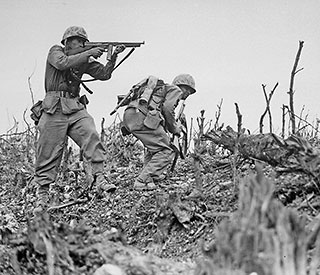
What famous novelist served as a foreign war correspondent in the Spanish Civil War and WWII?
A | Graham Greene |
B | Ernest Hemingway |
C | Jack London |
D | George Orwell |
E | John Steinbeck |
Question 3 :
ANSWER: B. Ernest Hemingway
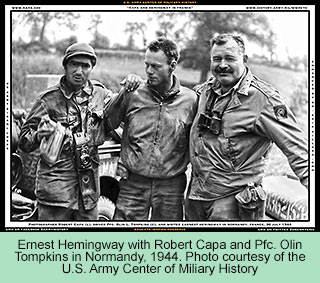

Question 4 |
Who wrote the open letter "J'Accuse...!" ("I Accuse...!"), published on the front page of Georges Clemenceau's liberal Paris daily L'Aurore on January 13, 1898?
A | Honoré de Balzac |
B | Paul Cézanne |
C | Victor Hugo |
D | Molière |
E | Émile Zola |
Question 4 :
ANSWER: E. Émile Zola
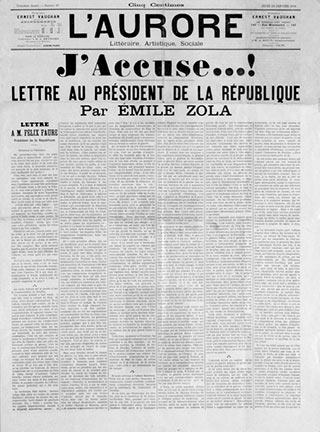
Émile Édouard Charles Antoine Zola (1840 – 1902) was a French novelist, playwright, journalist, and founder of the Naturalist movement in 19th-century French literature. Zola’s "J'Accuse...!" ("I Accuse...!" ) was an open letter to the President of France, Félix Faure, accusing the French government of falsely convicting Alfred Dreyfus, a French artillery officer of Jewish faith and ancestry, for treason. Dreyfus was found guilty in a secret military court-martial, during which he was denied the right to examine the evidence against him. The Army stripped him of his rank in a humiliating ceremony and shipped him off to Devil's Island, a penal colony located off the coast of French Guiana in South America. Known as the Dreyfus affair, it became one of the most controversial and polarizing political dramas in modern French history. Zola risked his career when he decided to stand up for Alfred Dreyfus as well as attack anti-Semitism. His intention was to draw the accusation so broadly that he would essentially force men in the government to sue him for libel. Once the suit was filed, the Dreyfusards (supporters of Dreyfus) would have the opportunity to acquire and publicize the shaky evidence on which Dreyfus had been convicted. Zola titled his letter "J’Accuse" (French for "I Accuse"), which was published on the front page of Georges Clemenceau's liberal Paris daily L'Aurore. Zola was brought to trial for publishing his letter to the President, and was convicted two weeks later for libel. Sentenced to jail, Zola fled to England, and stayed there until the French Government collapsed; he continued to defend Dreyfus. Four years after this famous letter to the president, Zola died from carbon monoxide poisoning caused by a blocked chimney. In 1953, the newspaper Liberation published a death-bed confession by a Parisian roofer that he had murdered Zola by blocking the chimney of his house. On 4 June 1908, Zola's remains were laid to rest in the Panthéon in Paris.
In 1899, Dreyfus returned to France for a retrial, but although found guilty again, he was pardoned. Dreyfus appealed his case again in 1906 to obtain the annulment of his guilty verdict. He was also awarded the Cross of the Légion d'honneur, which was for “a soldier who has endured an unparalleled martyrdom." While attending a ceremony removing Zola's ashes to the Panthéon on 4 June 1908, Dreyfus was wounded in the arm by a gunshot from a right-wing journalist.
Zola’s famous words led to a number of other "J'Accuse...!"

Émile Édouard Charles Antoine Zola (1840 – 1902) was a French novelist, playwright, journalist, and founder of the Naturalist movement in 19th-century French literature. Zola’s "J'Accuse...!" ("I Accuse...!" ) was an open letter to the President of France, Félix Faure, accusing the French government of falsely convicting Alfred Dreyfus, a French artillery officer of Jewish faith and ancestry, for treason. Dreyfus was found guilty in a secret military court-martial, during which he was denied the right to examine the evidence against him. The Army stripped him of his rank in a humiliating ceremony and shipped him off to Devil's Island, a penal colony located off the coast of French Guiana in South America. Known as the Dreyfus affair, it became one of the most controversial and polarizing political dramas in modern French history. Zola risked his career when he decided to stand up for Alfred Dreyfus as well as attack anti-Semitism. His intention was to draw the accusation so broadly that he would essentially force men in the government to sue him for libel. Once the suit was filed, the Dreyfusards (supporters of Dreyfus) would have the opportunity to acquire and publicize the shaky evidence on which Dreyfus had been convicted. Zola titled his letter "J’Accuse" (French for "I Accuse"), which was published on the front page of Georges Clemenceau's liberal Paris daily L'Aurore. Zola was brought to trial for publishing his letter to the President, and was convicted two weeks later for libel. Sentenced to jail, Zola fled to England, and stayed there until the French Government collapsed; he continued to defend Dreyfus. Four years after this famous letter to the president, Zola died from carbon monoxide poisoning caused by a blocked chimney. In 1953, the newspaper Liberation published a death-bed confession by a Parisian roofer that he had murdered Zola by blocking the chimney of his house. On 4 June 1908, Zola's remains were laid to rest in the Panthéon in Paris.
In 1899, Dreyfus returned to France for a retrial, but although found guilty again, he was pardoned. Dreyfus appealed his case again in 1906 to obtain the annulment of his guilty verdict. He was also awarded the Cross of the Légion d'honneur, which was for “a soldier who has endured an unparalleled martyrdom." While attending a ceremony removing Zola's ashes to the Panthéon on 4 June 1908, Dreyfus was wounded in the arm by a gunshot from a right-wing journalist.
Zola’s famous words led to a number of other "J'Accuse...!"
- In 1915, the German pacifist Richard Grelling wrote a book titled J'Accuse! in which he condemned the actions of the German Empire.
- In 1919, French film director Abel Gance released his film J'accuse as a statement against World War I, shooting Gance to international fame.
- In 1925, the most popular Palestinian Arab newspaper, Filastin (La Palestine), published a four-page editorial protesting the Balfour Declaration with the title "J'Accuse!"
- In 1938, the Belgian fascist politician Léon Degrelle published a polemic booklet titled J'accuse against minister Paul Stengers, of being a "cumulard, a bankster, a plunderer of savings and a coward". It provoked a retaliatory pamphlet titled J'accuse Léon Degrelle.
- In 1950, on Easter Sunday, members of the Lettrist movement proclaimed the death of God before the congregation of the Notre-Dame Cathedral in Paris. Michel Mourre used the phrase "J'accuse" to proclaim what he saw as the wickedness of the Roman Catholic Church.
- In 1954, during the controversy surrounding J. Robert Oppenheimer and the allegations that he posed a security risk to the Atomic Energy Commission, journalists Joseph and Stewart Alsop wrote an article for Harper's Magazine titled "We Accuse!", in which they defend Oppenheimer as the victim of a petty grudge held by AEC chairman Lewis Strauss.
- In 1961, during the trial of Adolf Eichmann, head prosecutor Gideon Hausner used the phrase in his opening statement.
- In 1974 the book 'Upon My Word!' contained a humorous story from the UK radio panel game 'My Word' by Frank Muir which featured Zola calling for an imaginary English painter named Jack Hughes to assist Manet in painting 'Dejeuner sur l'herbe'.
- In 1997, the South Park episode "Terrance and Phillip in Not Without My Anus" sees Terrance and Phillip on trial for murder. During the closing argument, Scott, the prosecutor says "j'ai accuse" (sic).
- In 1998, the Australian satirical television program The Games debuted a character named Jack Hughes in an episode titled "J'Accuse". The show was a satire critical of, among other things, corruption in the organizing of the Olympic Games in Sydney; the character Jack Hughes was a journalist who often probed into scandals and corruption, much to the annoyance of the show's protagonists.
- In 2001, The West Wing episode "The Indians in the Lobby" includes President Josiah Bartlet accosting the first lady by proclaiming "J'Accuse, mon petit fromage!"
- In 2003, New Directions published Israeli poet Aharon Shabtai's J'Accuse, a collection of poems drawn from two different collections, Politika and Artzenu and translated by Peter Cole.
- In 2008, film director Peter Greenaway released a documentary titled Rembrandt's J'Accuse. It is a companion piece to his film Nightwatching. It illustrates Greenaway's theory that Rembrandt's painting The Night Watch leaves clues to a murder by some of those portrayed.
- In 2012, Wayne Swan, the then Deputy Prime Minister of Australia, told Prime Minister Julia Gillard that she had given the "j'accuse speech" when she delivered her misogyny speech to the Australian Parliament, accusing Opposition Leader Tony Abbott of sexism and misogyny.
- On October 7, 2013, the Cartoon Network show Adventure Time released an episode titled 'Box Prince'. In the episode the main protagonist "Finn" is attempting to aid the rightful prince of the Box Kingdom after discovering he was replaced by an impostor. When confronting the imposter prince he swings his arm towards the false leader and shouts "J'accuse!".
- On May 13, 2016, Brazilian columnist and politics professor Vladimir Safatle published an article in the Folha de S.Paulo newspaper titled "Nós acusamos" (we accuse) denouncing the several problems related to the removal from office of Brazil's president Dilma Rousseff.
- On September 1, 2016, Argentinian lawyer and politician Margarita Stolbizer published a book titled Yo acuso ("I accuse") denouncing corruption during the government of Argentina's president Cristina Kirchner.
- On June 9, 2017, The New York Times' White House correspondent Peter Baker wrote, in reference to the testimony of fired US FBI director James Comey before the US Senate's Intelligence Committee, "While delivered in calm, deliberate and unemotional terms, Mr. Comey’s testimony on Thursday was almost certainly the most damning j’accuse moment by a senior law enforcement official against a president [referring to Donald Trump] in a generation."
Question 5 |

Which musician has accumulated the most wealth?
A | Beyoncé & Jay-Z |
B | Mick Jagger |
C | Elton John |
D | Paul McCartney |
E | Bruce Springsteen |
Question 5 :
ANSWER: D. Paul McCartney
Paul McCartney: $1.2 billion
Bruce Springsteen: $500 Million
Elton John: $450 million
Mick Jagger: $360 million
Beyoncé & Jay-Z: $162 million
To determine our rankings, we consider income from touring, music and outside business ventures with the help of Pollstar, Nielsen Music and interviews with industry insiders including many of the stars themselves. Our list measures pretax earnings and does not deduct fees for agents, managers or lawyers. The ranking once again highlights an unfortunate reality of the music business: just ten women out of 40 names, only a marginal improvement over last year's one-in-five ratio, while 15 people of color made the list, though five of them in the top ten.
Paul McCartney: $1.2 billion
Bruce Springsteen: $500 Million
Elton John: $450 million
Mick Jagger: $360 million
Beyoncé & Jay-Z: $162 million
To determine our rankings, we consider income from touring, music and outside business ventures with the help of Pollstar, Nielsen Music and interviews with industry insiders including many of the stars themselves. Our list measures pretax earnings and does not deduct fees for agents, managers or lawyers. The ranking once again highlights an unfortunate reality of the music business: just ten women out of 40 names, only a marginal improvement over last year's one-in-five ratio, while 15 people of color made the list, though five of them in the top ten.
Once you are finished, click the button below. Any items you have not completed will be marked incorrect.
Get Results
There are 5 questions to complete.
You have completed
questions
question
Your score is
Correct
Wrong
Partial-Credit
You have not finished your quiz. If you leave this page, your progress will be lost.
Correct Answer
You Selected
Not Attempted
Final Score on Quiz
Attempted Questions Correct
Attempted Questions Wrong
Questions Not Attempted
Total Questions on Quiz
Question Details
Results
Date
Score
Hint
Time allowed
minutes
seconds
Time used
Answer Choice(s) Selected
Question Text
All done
Deplorable! You need to travel more! This is pathetic!
Deplorable! You need to travel more! This is pathetic!
Embarrassing! Keep trying! We know you're better than that. Play the game again.
Not that bad! But not good either. Play the game again.
Pretty good ... but not perfect.
Perfect! Are you brilliant traveler or what?
